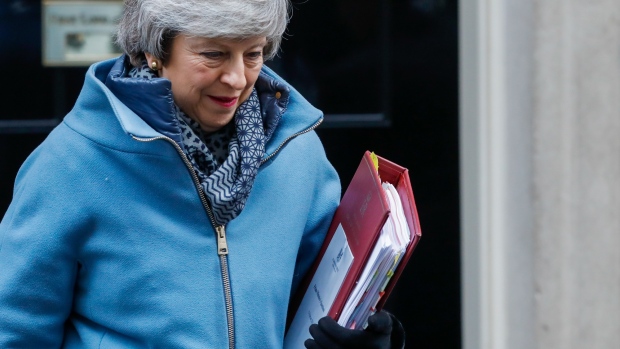Feb 22, 2019
May approaches Brexit high noon as rebels push to delay
, Bloomberg News

Theresa May must promise to delay Brexit next week or risk being forced into it by a revolt in Parliament, according to Conservatives in her Cabinet and party.
With just five weeks until Britain leaves the European Union, and little prospect of an imminent breakthrough, the prime minister is running out of ways to stave off a rebellion by lawmakers who want to prevent Britain crashing out of the bloc without a deal.
She’s lost the trust of lawmakers on both wings of her party, so unless she pulls off a deal by Wednesday, they’re unwilling to give her more time to deliver. By forcing an extension, they hope to avert the no-deal scenario that businesses consider catastrophic.
May has refused to rule out leaving without an agreement. It’s a negotiating tactic, and one the pro-Brexit wing of her party demands she keeps in her arsenal. But a growing group of Conservative ministers and members of Parliament are horrified by the risks that poses to jobs and livelihoods. Three Tory MPs quit the party this week, accusing May of being held captive by hardliners in her party.
Parliament is due to vote again on the progress of talks Feb. 27. May has twice managed to persuade MPs to allow her the space to negotiate. Few in her party think she will get a third chance. One minister said that after giving her the benefit of the doubt twice, it wouldn’t be credible to do it again.
Six ministers have said privately that unless May makes it clear she will seek an extension to talks, they will join other usually loyal Conservatives and vote for the negotiations to be taken out of her hands, and force her to ask the EU for the departure date to be postponed.
In a signal of intent, three cabinet ministers went public Friday evening with a warning that Parliament wouldn’t allow a no-deal Brexit to happen. Pensions Secretary Amber Rudd, Justice Secretary David Gauke and Business Secretary Greg Clark wrote a joint article in the Daily Mail. Although apparently aimed at the prime minister’s internal enemies, it was also an encouragement to those thinking of rebelling to push for an extension.
The EU -- which also wants to avoid a cliff-edge departure -- is expecting the U.K. to ask for an extension, and would probably grant one. European officials say they don’t think there will be a breakthrough in talks at a summit in Sharm El-Sheikh this weekend -- reducing the chances of May bringing something back in time for the showdown vote Wednesday.
May has no majority in Parliament, meaning that only a small rebellion is needed to defeat her. Those coordinating the moves against the prime minister are confident they have the numbers they need.
The consequences of such a vote are hard to predict. Some in the European Research Group of pro-Brexit purists have talked privately about trying to bring the government down if May looks like putting off the divorce. They could do that by announcing that they would vote with the opposition Labour Party in a confidence motion. If May lost, it would start the clock ticking to a general election.
But that threat has become more difficult to carry out following the split in the Labour Party this week. Nine members of Parliament have now left in protest at Jeremy Corbyn’s leadership. None would vote for an election where, fighting as independents without party machinery, they would be likely to lose their seats.
May’s only other option is to come back from this weekend’s meeting of EU leaders in Egypt with something sufficiently impressive that she can convince the rebellious moderates in her party that a deal is imminent. Her problem here is that it’s not simply that her party doesn’t trust her any more -- they don’t trust each other, either.
On Feb. 14, May was defeated in a vote on the progress of Brexit negotiations, after the ERG abstained, objecting that the wording of the motion ruled out a no-deal departure.
That vote wasn’t binding, but for many Tory MPs the ERG’s decision was the final straw. In the immediate aftermath of the vote there were furious arguments in the corridors of Parliament, with moderate MPs accusing ERG colleagues of being unwilling to agree to anything. That makes them more likely to think they should take control out of May’s hands -- as they say she’s been too prone to give in to hardliners’ demands.
“Some of my colleagues have got to recognize that the game they have thus far been playing with regards to this whole process is not going to end well for them,” Andrew Percy, a Tory MP, told the BBC on Friday. He said that ERG intransigence “could potentially end with the delaying of or perhaps even no Brexit.”
That was the message too of the article from Rudd, Gauke and Clark. “It is time that many of our Conservative party colleagues in the ERG recognize that Parliament will stop a disastrous no-deal Brexit on March 29,” they wrote. “If that happens, they will have no one to blame but themselves for delaying Brexit.”
On the WhatsApp group that ERG MPs use to compare notes, the mood has been hardening, according to one member. ERG members haven’t had much practice at compromising, but one member, also speaking anonymously, said they feared the choice they faced was between a Brexit they didn’t like and a Brexit delayed by two years. It was, they said, very difficult to know what to do.
Another Tory MP, who wants to keep Britain inside the EU, smiled this week as he observed that Euroskeptics in his party, the people who have done so much to get Britain to the threshold of leaving, might be the people whose inflexibility ended up keeping Britain in the bloc.






